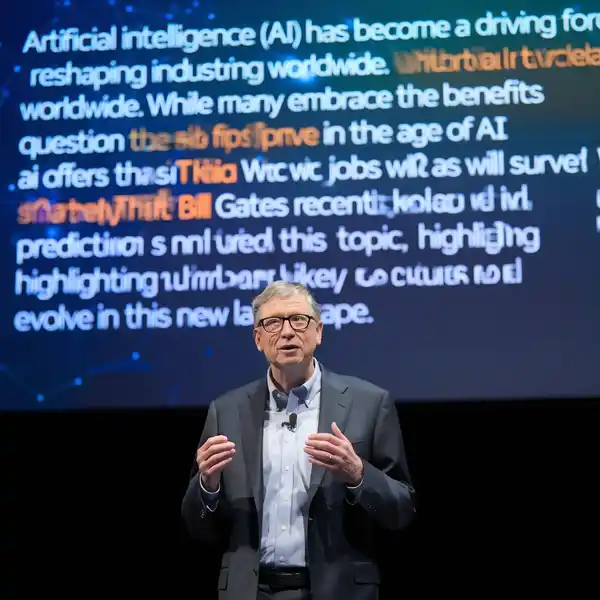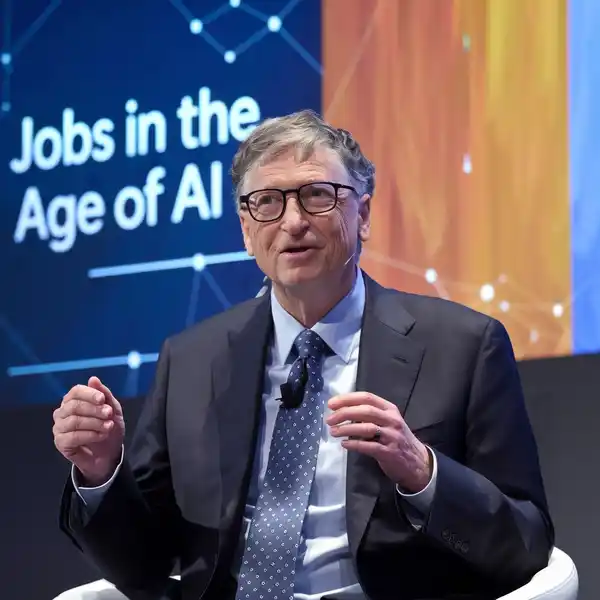What Jobs Will Survive After AI? Bill Gates’ Bold Prediction
Artificial Intelligence (AI) has become a driving force in reshaping industries worldwide. While many embrace the benefits AI offers, a pressing question looms: What jobs will survive in the age of AI? Tech visionary Bill Gates recently shared his bold predictions on this topic, highlighting the roles that are likely to endure and evolve in this new landscape.
The AI Revolution: A Snapshot
AI is advancing rapidly, automating tasks in fields like manufacturing, customer service, and data analysis. ChatGPT, autonomous vehicles, and robotic process automation (RPA) are just the tip of the iceberg. While this transformation boosts efficiency, it also raises concerns about job displacement. However, Gates’ insights suggest that not all professions are at risk.
Bill Gates’ Perspective on AI and Jobs

In a recent interview, Bill Gates stated that AI will profoundly change the job market but won’t replace human creativity, empathy, or complex problem-solving. According to Gates, roles that require uniquely human skills will continue to thrive. Here are the key sectors he emphasized:
- Healthcare and Caregiving Jobs in healthcare—nurses, doctors, and caregivers—will remain essential. Gates explained that AI can assist with diagnostics and administrative tasks but cannot replace the human touch needed for patient care. Empathy, communication, and hands-on expertise are irreplaceable.Related link: AI’s Role in Healthcare
- Education Teachers and educators are unlikely to be replaced by AI. While AI can enhance personalized learning and administrative efficiency, the human element in mentoring, inspiring, and connecting with students is indispensable.
- Creative Industries Creativity is one of the hardest aspects for AI to replicate. Jobs in writing, art, music, and film-making will continue to thrive, especially those requiring innovation and originality.Related link: AI and Creativity
- Technical Maintenance and AI Development As AI systems grow, they will need skilled technicians and engineers to design, maintain, and update them. Gates predicts a surge in demand for jobs related to programming, robotics, and AI ethics.
- Environmental Sciences Addressing climate change requires innovative solutions that blend technology with human expertise. Roles in environmental sciences and sustainability will expand, with AI playing a supportive role rather than taking over.
Key Skills for AI-Resistant Jobs
To thrive in an AI-driven world, Gates advises focusing on developing the following skills:
- Emotional Intelligence (EQ): Careers requiring interpersonal skills, such as counseling or negotiation, will continue to demand human involvement.
- Critical Thinking: Problem-solving in complex, unpredictable situations remains a uniquely human capability.
- Adaptability: As industries evolve, being flexible and willing to learn new skills is crucial.
- Technological Literacy: Understanding and working alongside AI tools will be a valuable asset.
Industries at Higher Risk of Automation
While many jobs are AI-resistant, some roles are more susceptible to automation. Gates highlighted fields where repetitive, predictable tasks dominate:
- Manufacturing and Production: Robotics and AI already perform assembly-line tasks with greater efficiency.
- Data Entry and Administrative Roles: AI algorithms can manage large datasets and automate repetitive administrative work.
- Customer Service: Chatbots and virtual assistants are increasingly handling customer inquiries.
Preparing for the AI Future

- Upskilling and Reskilling Governments, organizations, and individuals must invest in continuous learning. Platforms like Coursera and Udemy offer courses in emerging technologies and soft skills.Related link: Learn New Skills on Coursera
- AI Collaboration Rather than fearing AI, professionals should embrace it as a tool to enhance productivity. Learning to work alongside AI can provide a competitive edge.
- Policy and Regulation Gates emphasized the need for proactive policies to mitigate job displacement. Governments must ensure social safety nets and foster job creation in AI-resistant sectors.
The Positive Side of AI
Despite concerns, AI also creates new opportunities. Entirely new industries—like AI ethics, drone operation, and virtual reality—are emerging. Gates remains optimistic, suggesting that while some jobs will fade, others will be redefined or created, leading to a dynamic and innovative workforce.
Conclusion: Embracing Change
AI is undoubtedly reshaping the job market, but Bill Gates’ predictions provide hope. By focusing on roles requiring creativity, empathy, and adaptability, individuals can secure their place in the future workforce. Embracing AI as an ally rather than a threat is key to thriving in this evolving landscape.
To learn more about preparing for the AI revolution, explore resources like:
The AI era is here, and while change is inevitable, opportunities abound for those willing to adapt and innovate.




